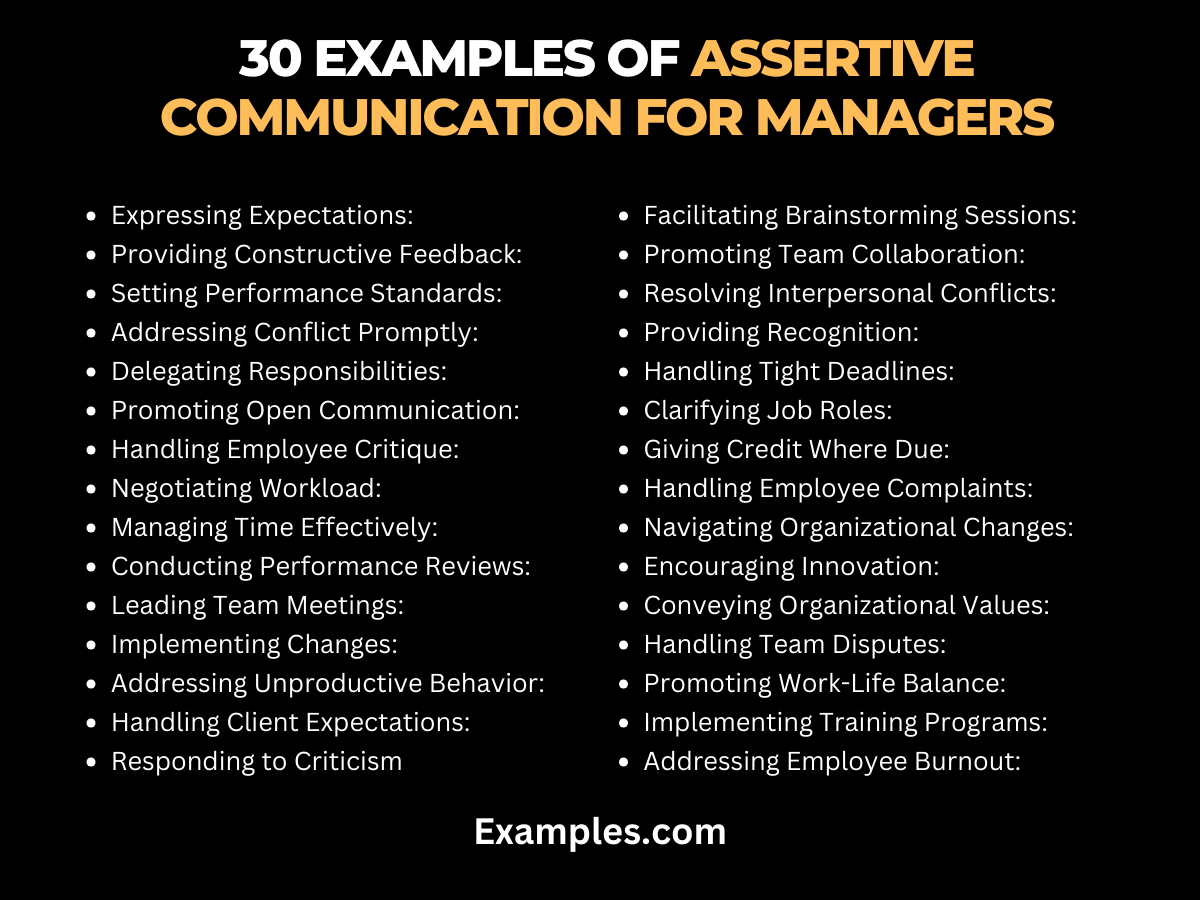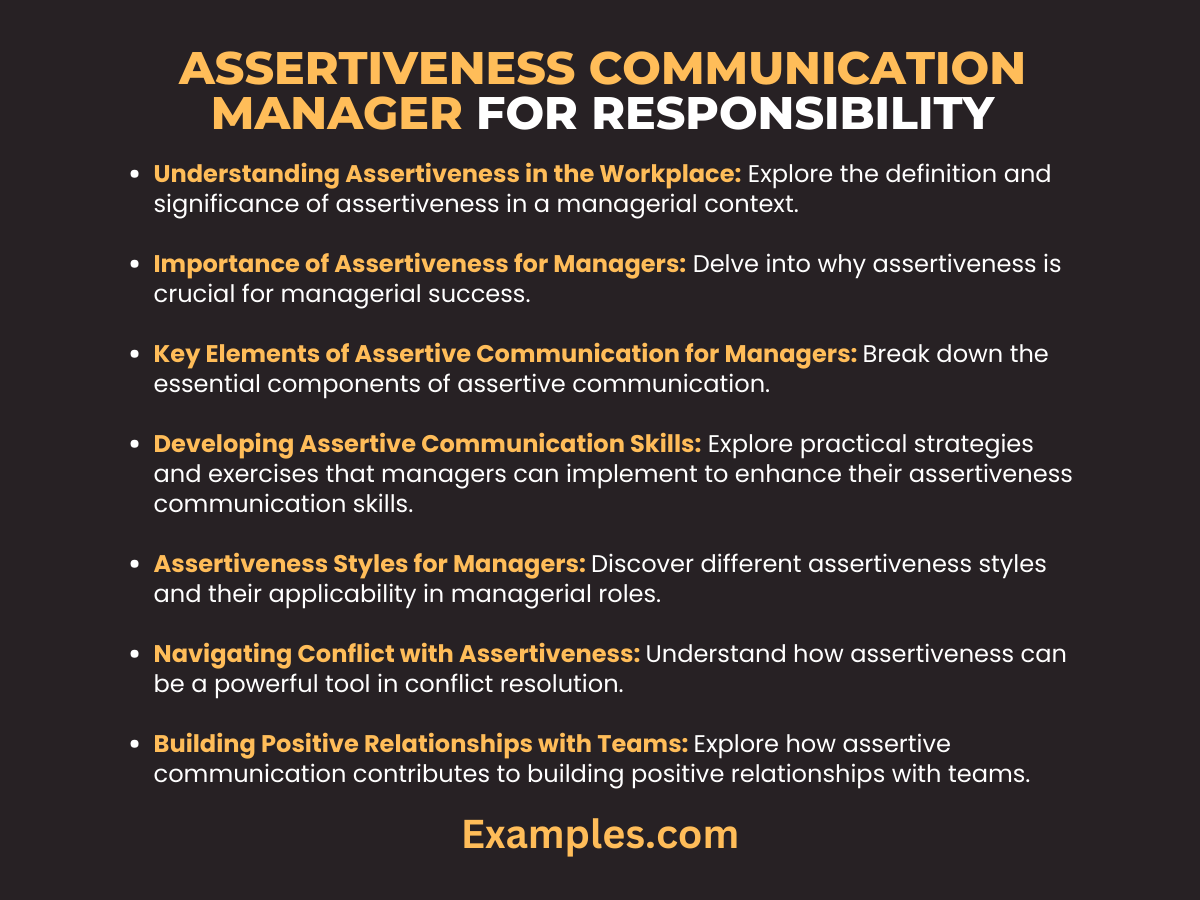Assertive Communication for Managers
Unlock the key to effective leadership with Assertive Communication for Managers. Delve into the definition, rich examples, origin, and historical significance of assertive communication in the managerial realm. Explore the ‘how-to’ aspects and gain valuable tips on integrating assertiveness seamlessly into managerial practices. Elevate your leadership style, enhance team dynamics, and foster a workplace culture that thrives on transparent, respectful, and influential communication. Master the art of assertive communication for managerial success and lasting impact.
What is Assertive Communication for Managers?

Assertive Communication for Managers refers to a leadership communication style where managers express their thoughts, needs, and expectations openly and respectfully. It involves confidently conveying ideas, setting clear boundaries, and actively listening to team members. This approach fosters a positive work environment, enhances collaboration, and ensures effective decision-making. Assertive managers strike a balance between being respectful and direct, creating a culture of open communication and constructive feedback within the organizational framework.
30 examples of Assertive Communication for Managers

Assertive Communication for Managers, highlighting essential scenarios where effective leadership communication makes a difference. Each example showcases the application of assertiveness in diverse managerial situations, fostering collaboration, resolving conflicts, and promoting a positive workplace culture.
- Expressing Expectations: Clearly communicate project expectations, ensuring everyone is on the same page for successful outcomes.
- Providing Constructive Feedback: Offer feedback in a constructive manner, focusing on improvement rather than criticism for employee development.
- Setting Performance Standards: Define performance standards, aligning team goals with organizational objectives for optimal results.
- Addressing Conflict Promptly: Confront conflicts promptly, seeking resolution to maintain a harmonious work environment.
- Delegating Responsibilities: Delegate tasks effectively, considering team members’ strengths for efficient workflow.
- Promoting Open Communication: Encourage team members to share ideas openly, fostering innovation and collaboration.
- Handling Employee Critique: Address employee critiques calmly, emphasizing growth opportunities and positive aspects.
- Negotiating Workload: Negotiate workload distribution, ensuring fairness and preventing burnout among team members.
- Managing Time Effectively: Communicate time expectations clearly, optimizing work schedules for increased productivity.
- Conducting Performance Reviews: Conduct performance reviews transparently, recognizing achievements and addressing areas for improvement.
- Leading Team Meetings: Lead team meetings assertively, guiding discussions and ensuring everyone’s voice is heard.
- Implementing Changes: Communicate changes transparently, explaining the rationale and benefits to gain team buy-in.
- Addressing Unproductive Behavior: Confront unproductive behavior assertively, emphasizing its impact on the team and organization.
- Handling Client Expectations: Manage client expectations assertively, balancing deliverables with realistic timelines.
- Responding to Criticism: Respond to external criticism calmly, addressing concerns professionally and seeking resolution.
- Facilitating Brainstorming Sessions: Facilitate brainstorming sessions effectively, encouraging diverse ideas and perspectives.
- Promoting Team Collaboration: Promote team collaboration assertively, emphasizing the collective effort for shared success.
- Resolving Interpersonal Conflicts: Address interpersonal conflicts promptly, mediating for a cohesive team dynamic.
- Providing Recognition: Acknowledge and recognize achievements promptly, boosting morale and motivation.
- Handling Tight Deadlines: Communicate expectations during tight deadlines, prioritizing tasks for efficient project completion.
- Clarifying Job Roles: Clearly define job roles and responsibilities, minimizing confusion and enhancing accountability.
- Giving Credit Where Due: Attribute success to team members, acknowledging individual contributions assertively.
- Handling Employee Complaints: Address employee complaints assertively, investigating concerns and providing solutions.
- Navigating Organizational Changes: Guide teams through organizational changes assertively, ensuring smooth transitions.
- Encouraging Innovation: Foster a culture of innovation by encouraging and implementing innovative ideas assertively.
- Conveying Organizational Values: Clearly convey organizational values, aligning team efforts with the company’s mission.
- Handling Team Disputes: Address team disputes assertively, mediating for a collaborative resolution.
- Promoting Work-Life Balance: Advocate for work-life balance assertively, supporting employee well-being.
- Implementing Training Programs: Communicate the importance of training programs, emphasizing skill enhancement for career growth.
- Addressing Employee Burnout: Address signs of burnout assertively, implementing measures to support employee well-being.
Assertiveness Communication at Workplace for Managers
Effective communication is the cornerstone of successful managerial leadership, and assertiveness plays a pivotal role in achieving this. Here’s a comprehensive guide for managers looking to enhance their assertiveness communication skills in the workplace.
1. Understanding Assertiveness in the Workplace: Explore the definition and significance of assertiveness in a managerial context. Understand how assertive communication differs from other communication styles.
2. Importance of Assertiveness for Managers: Delve into why assertiveness is crucial for managerial success. Uncover how assertive managers can foster a positive work culture and improve team dynamics.
3. Key Elements of Assertive Communication for Managers: Break down the essential components of assertive communication, including active listening, clear expression, and respectful disagreement. Understand how these elements contribute to effective leadership.
4. Developing Assertive Communication Skills: Explore practical strategies and exercises that managers can implement to enhance their assertiveness communication skills. Learn how to apply these skills in various workplace scenarios.
5. Assertiveness Styles for Managers: Discover different assertiveness styles and their applicability in managerial roles. Identify the most effective assertiveness style based on specific workplace situations.
6. Navigating Conflict with Assertiveness: Understand how assertiveness can be a powerful tool in conflict resolution. Learn techniques for addressing and resolving conflicts assertively to maintain a harmonious work environment.
7. Building Positive Relationships with Teams: Explore how assertive communication contributes to building positive relationships with teams. Learn how to establish trust, encourage collaboration, and promote a healthy team dynamic.
8. Balancing Assertiveness and Empathy: Find the equilibrium between assertiveness and empathy in managerial communication. Discover how combining these elements enhances leadership effectiveness.
9. Communicating Expectations Clearly: Learn the art of setting and communicating expectations assertively. Understand how clear expectations contribute to team productivity and success.
10. Overcoming Barriers to Assertive Communication: Identify common barriers to assertive communication in the workplace and explore strategies to overcome them. Overcoming these barriers is crucial for effective leadership.
Assertive Communication Leadership for Managers
In the dynamic realm of managerial leadership, assertive communication skills are indispensable. This comprehensive guide delves into the intricacies of assertive communication, specifically tailored for managers aiming to enhance their leadership prowess.
1. Understanding Assertive Communication in Leadership: Explore the core principles of assertive communication and its transformative impact on effective leadership. Gain insights into how assertiveness contributes to a positive leadership style.
2. The Role of Assertiveness in Managerial Effectiveness: Uncover the critical link between assertive communication and managerial effectiveness. Learn how assertiveness empowers managers to lead with clarity, confidence, and fairness.
3. Key Components of Assertive Leadership Communication: Delve into the key components that define assertive communication in a leadership context. From clear expression to active listening, discover the skills that set assertive leaders apart.
4. Developing Assertive Communication Skills for Leadership: Practical tips and actionable strategies for managers to develop and hone their assertive communication skills. Learn how to integrate assertiveness seamlessly into your leadership toolkit.
5. Navigating Challenges with Assertive Communication: Explore real-world scenarios where assertive communication proves instrumental in overcoming leadership challenges. Gain insights into addressing conflicts, managing teams, and fostering a positive work environment.
6. Impact on Team Dynamics: Understand how assertive communication influences team dynamics. Discover strategies to create a collaborative and communicative team culture under assertive leadership.
7. Balancing Assertiveness and Empathy: Learn the art of balancing assertiveness with empathy in leadership communication. Understand how a harmonious blend fosters stronger relationships and team cohesion.
8. Implementing Assertive Communication in Decision-Making: Explore the application of assertive communication in managerial decision-making processes. Learn how to convey decisions with clarity and garner team support.
9. Overcoming Challenges and Resistance: Address common challenges and resistance faced when adopting assertive communication in leadership roles. Develop strategies to navigate pushback effectively.
10. Case Studies of Successful Assertive Leadership Communication: Dive into real-world case studies highlighting successful leaders who leverage assertive communication for organizational success. Extract valuable lessons and insights.
Assertiveness communication manager for responsibility

In the dynamic landscape of leadership, effective communication skills are paramount, especially when it comes to managerial responsibilities. Assertiveness in communication for managers is a key facet, shaping the way responsibilities are delegated, tasks are accomplished, and teams are led. Let’s delve into a comprehensive guide on how assertive communication skills empower managers to navigate their responsibilities successfully.
1. Understanding Assertiveness in Managerial Communication: Assertiveness, in a managerial context, involves expressing expectations, delegating tasks, and addressing challenges with confidence while respecting the perspectives of team members.
2. Importance of Assertive Communication in Managerial Responsibilities: Explore the vital role assertiveness plays in managerial responsibilities, from setting expectations to resolving conflicts and fostering a positive work environment.
3. Core Skills for Assertive Managerial Communication: Identify and hone the essential communication skills that contribute to assertiveness in managerial roles, including active listening, clear expression, and constructive feedback.
4. Setting Clear Expectations: Learn how assertive communication aids managers in setting clear expectations, ensuring that team members understand their roles and responsibilities.
5. Delegating Tasks Effectively: Explore the art of assertive delegation, allowing managers to distribute tasks based on team members’ strengths, optimizing productivity and efficiency.
6. Addressing Challenges and Conflicts: Understand how assertiveness enables managers to address challenges and conflicts promptly, seeking resolution while maintaining a positive team dynamic.
7. Creating a Positive Work Environment: Discover how assertive communication contributes to the creation of a positive work environment, fostering collaboration, innovation, and a sense of belonging.
8. Balancing Firmness and Empathy: Learn the delicate balance between firmness and empathy, a hallmark of assertive managerial communication, ensuring effectiveness without compromising team morale.
9. Empowering Team Members: Explore how assertive communication empowers team members by encouraging open dialogue, active participation, and a shared sense of responsibility.
10. Providing Constructive Feedback: Master the art of providing constructive feedback assertively, focusing on improvement and growth while maintaining a supportive environment.
What are the Assertive Communication Styles Every Manager Should Know?
Effective communication is the cornerstone of successful leadership, and for managers, mastering assertive communication styles is crucial. Here’s a comprehensive guide to various assertive communication styles that every manager should be well-versed in:
- Direct Communication: Directness is key for managers. Learn to communicate clearly and succinctly, ensuring your message is easily understood without ambiguity.
- Open and Honest Expression: Foster trust by openly expressing thoughts and feelings. Honest communication builds strong relationships within the team.
- Non-Verbal Assertiveness: Understand the power of body language. Non-verbal cues convey confidence and assertiveness, enhancing your managerial presence.
- Empathetic Listening: Master the art of empathetic listening. Understand your team’s perspectives, fostering a culture of understanding and collaboration.
- Respectful Disagreement: Encourage differing opinions respectfully. Constructive disagreements lead to innovative solutions and stronger team dynamics.
- Solution-Oriented Approach: Focus on solutions rather than dwelling on problems. Managers who adopt a solution-oriented approach inspire proactive problem-solving.
- Firm Boundary Setting: Set clear and firm boundaries. Effective managers know how to establish limits while maintaining respect within the team.
- Positive Affirmation: Acknowledge and affirm positive behaviors. Positive reinforcement boosts morale and motivates the team toward excellence.
- Constructive Criticism: Provide feedback constructively. Managers who offer criticism with a focus on improvement foster a culture of continuous learning.
- Calm and Composed Response: Maintain composure in challenging situations. A calm response showcases emotional intelligence and enhances your managerial credibility.
Why is Assertive Communication Important in Managers?
Assertive communication is a vital skill for managers that goes beyond effective dialogue. Understanding why assertive communication is crucial can significantly impact managerial success:
- Enhanced Team Collaboration: Assertive managers promote an environment where team members feel comfortable sharing ideas, fostering collaboration and innovation.
- Conflict Resolution: Assertiveness facilitates constructive conflict resolution. Managers skilled in assertive communication navigate disagreements effectively, maintaining a harmonious workplace.
- Improved Decision-Making: Managers who communicate assertively gather diverse perspectives, leading to well-informed decisions that benefit the entire team.
- Increased Employee Engagement: Assertive communication builds trust and transparency, leading to higher levels of employee engagement and commitment to organizational goals.
- Effective Delegation: Assertive managers excel in delegating tasks. Clear communication ensures that responsibilities are understood, leading to increased productivity.
- Positive Workplace Culture: Assertiveness contributes to a positive workplace culture where open communication, respect, and mutual understanding thrive.
- Boosted Morale and Motivation: Employees respond positively to assertive leaders who provide clear expectations and recognition, leading to boosted morale and motivation.
- Adaptability and Flexibility: Assertive managers effectively convey changes and adapt to evolving situations, fostering a resilient and adaptable team.
- Reduced Misunderstandings: Clear and assertive communication minimizes misunderstandings, reducing the likelihood of conflicts and enhancing overall efficiency.
- Enhanced Leadership Credibility: Assertive communication enhances a manager’s credibility, showcasing leadership qualities that inspire trust and confidence among team members.



